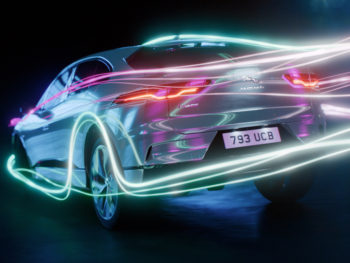Electric Jaguar XJ to safeguard Castle Bromwich future
Jaguar Land Rover has confirmed that its next-generation XJ will go electric, safeguarding the future of its Castle Bromwich plant and spearheading a range of electrified vehicles.

The next-generation XJ will go electric as part of JLR plans to have electrified versions of all models from 2020
Announced as the last of the current-generation XJs rolled off the production line, the much-rumoured announcement delivers on the company’s commitment to offer customers electrified options for all new Jaguar and Land Rover models from 2020.
The new XJ will be created by the team of designers and product development specialists who developed the I-Pace and will spearhead the transformation of JLR’s Castle Bromwich facility as the “UK’s first premium electrified vehicle plant”.
Dr Ralf Speth, chief executive officer of Jaguar Land Rover, said: “The future of mobility is electric and, as a visionary British company, we are committed to making our next generation of zero-emission vehicles in the UK.”
The announcement secures a future for the plant, which has seen a series of temporary closures and production adjustments. Jaguar Land Rover also announced cutbacks of 4,500 jobs at the start of the year under a transformation plan that the carmaker said would deliver £2.5bn in cost reductions and cashflow improvements over 18 months, as well as long-term strategic operating efficiencies. Full-year results published in May for the 2018/19 financial year showed that the carmaker had returned to profitability in Q4 although it posted a £358m loss for the full year – £3.6bn including a one-off £3.1bn write-down – as a result of “multiple headwinds”, including the downturn in China but also declining diesel car sales.
With JLR also co-locating production of its Electric Drive Units (EDU) in Wolverhampton from later this year, supported by batteries assembled at a new JLR Battery Assembly Centre located at Hams Hall, North Warwickshire, Dr Speth said the carmaker was creating a “powerhouse of electrification in the Midlands”.
However, he also called on government and industry to work together to bring giga-scale battery production to the country, building on the UK Battery Industrialisation Centre and the Government’s Faraday Battery Challenge and making the UK less dependent on imported batteries.
Latest UK new car registration figures highlight the continued inroads being made by pure electric cars.
The figures published yesterday for June show that while overall registrations were down 4.9% – with diesel, plug-in hybrid and hybrid demand all showing declines, battery electric vehicle registrations were actually up 61.7% to 2,461 units, giving BEVs a 1.1% market share compared to 0.6% for June 2018.
And for the first six months of the year, registrations of pure electric vehicles were up 60.3%, with market share up to 0.9% from 0.6% for the half of 2018.
Mike Hawes, SMMT Chief Executive commented: “Today’s news is a huge boost for the UK motor industry and reaffirms Britain’s potential to become a global leader in zero emission technologies. To realise this, however, we need the right conditions to encourage more manufacturers to invest, innovate and sell competitively, including massive infrastructure investment and long-term support and incentives for consumers. When it comes to automotive supply, distance matters and securing significant giga-scale battery production here in the UK will be essential to future-proof this sector.”

